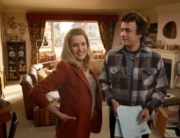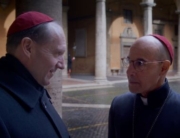It’s a mystery: When is the right time to tackle openly certain subjects, and how. Take, for example, the real-life case about how men from an isolated Mennonite community in the Manitoba Colony in Bolivia raped more than a hundred females for years—drugging them with an anesthetic for cows—while making them believe that they were victims of demons. The story inspired this film’s source, the 2019 novel Women Talking by Miriam Toews, who was raised as a Mennonite in Canada, but left the church and became a journalist and writer.
Adapted and directed by Sarah Polley with nerve and grace, the film begins with the statement: “What follows is an act of female imagination,” a reference to the power of fiction as a source of truth. Set in an unknown location, women of different ages have been sexually assaulted by men from their enclosed community. All have been raised in the same faith. The culprits have only admitted their crime after they were caught. While all of the men are away to pay the bail for the jailed suspects—part of a system of silent complicity, part of a community that prefers to impart justice internally—a group of women find themselves at a juncture. They agree to decide collectively what to do next: forgive the men within two days as is the custom, stay and fight, or leave the colony without the men, including the prospect of leaving behind the male children and teenagers.
Coming together to participate for the first time as a de facto jury, eight women (played by Rooney Mara, Claire Foy, Jessie Buckley, Judith Ivey, Sheila McCarthy, Michelle McLeod, Kate Hallett, and Liv McNeil) are chosen to gather in a barn and deliberate over two days. The movie mainly concentrates on the behind-closed-doors debate that will lead to a final decision, allowing the women an opportunity to cry, yell, and relieve the shared pain that manifests in different ways among the varied personalities and ways of thinking. Since they are illiterate (only men are allowed to read), they have to draw a mark on a ballot next to their preferred option. The only man present is the colony’s affable schoolteacher (Ben Whishaw), who acts as a scribe.
Polley’s script and her confident direction are more centered on the nuanced dialogue and the multiple questions raised than giving lectures with satisfactory answers. It’s a compassionate approach that wants viewers to listen without a preordained judgment. In other words, this is the kind of “message movie” that acts against expectations in how it explores the necessity of forgiveness, a subject that currently seems harder to include in conversations around difficult topics. Additionally, it’s surprising the generous amount of laughter and tender moments that occur alongside the expected tears and heartbreaking confessions.
Women Talking concentrates on characters and themes, not leaving much room for visual experimentation or complicated camerawork. It’s a trap that Polley manages to avoid from time to time with flashbacks revealing the aftermath of horrifying assaults, while small slices of life inside the community provide visual counterpoints to the static staging of the deliberations. There’s also strong visual poetry in the editing, linking words and images in a beautiful passage before the conclusion.
As an ensemble piece, every actor shines equally, but somehow the veterans (McCarthy and Ivey) and the lesser known among the cast possess a confident restraint that the film demands. However, considering all the great talent involved (kudos to Hildur Guðnadóttir’s engrossing score) and the social relevance, there’s a visual signature here that almost counts as a fatal flaw: the washed-out cinematography that denies life and color at the expense of everything else. You may understand the choice as a way to underline the seriousness of the subject, but it requires viewers to accustom their eyes when the rest is so soulful.







Leave A Comment